New EU directive to increase corporate responsibility
The latest in corporate-justice-related European directives has been agreed, affecting business operations and their negative social and environmental impacts…
In the continued efforts from the EU to increase the level of corporate social responsibility facing organisations operating in the EU, another directive has been agreed by The European Council after lengthy discussions. The Corporate Sustainability Due Diligence Directive (CSDDD) sets standards for a due diligence process for companies, focusing on operations adversely affecting human rights and environmental impacts.
The directive will apply for companies surpassing the thresholds detailed below for two consecutive years once the legislation is adopted by the various EU member state’s national authorities, which will happen over the next two years.
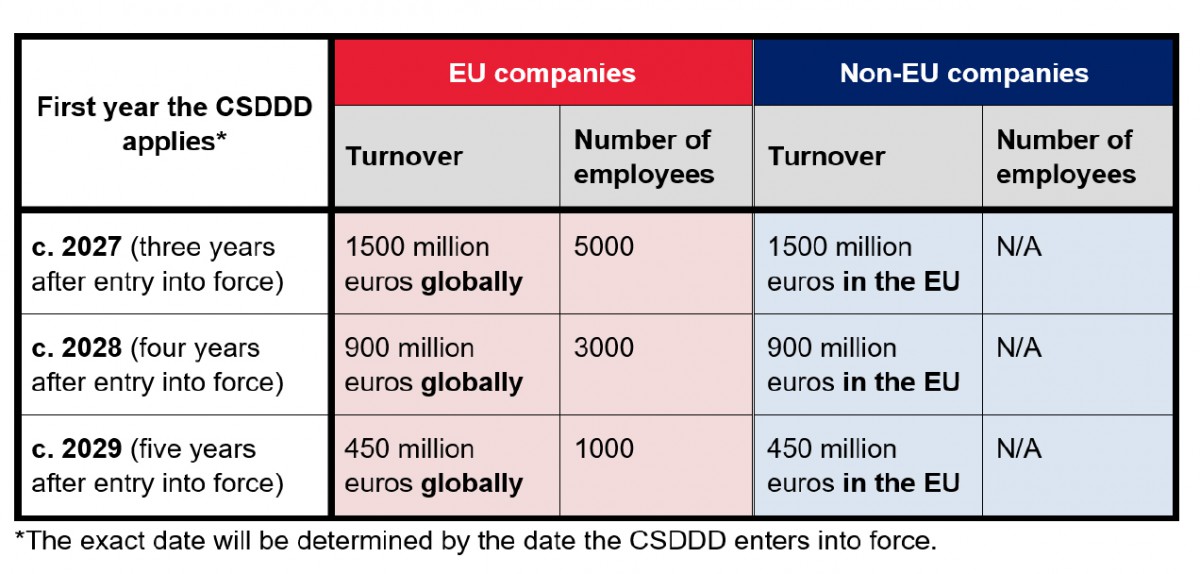
Companies falling into this scope will have to carry out the due diligence process as set out by this directive.
Principally, it requires human rights and environmental due diligence to be integrated into policies and risk-management systems throughout all levels of operation. Expanding on risk assessments they will have to identify and assess actual and potential human rights and environmental impacts. Impacts will include such things as forced labour, pollution and biodiversity loss. The assessment will include the company’s direct operations, as well as its subsidiaries and other aspects of the value chain.
Following this assessment, the company must then prevent or otherwise mitigate these impacts, as well as restore the affected persons, communities or the environment as close as possible to the position they would have been in without the adverse impact. Throughout this due diligence process, the highest priority must be given to the most likely and most severe impacts, while remaining transparent and keeping stakeholders included throughout all stages.
This directive will be combined with other similar directives, frameworks and regulations. For example, the risk-based approach for the due diligence outlined in this directive aligns with other well-recognised international frameworks such as the OECD Guidelines for Multinational Enterprises (OECD Guidelines) and the UN Guiding Principles on Business and Human Rights (UNGPs). The directive is also similar to existing national regulations such as the German Supply Chain Due Diligence Act (LkSG), the French law on the duty of vigilance and the proposed Dutch Child Labour Due Diligence Act.
The details and results from this process are to be included within the annual report as required for the CSRD.
This latest directive is representative of the increasing legal liabilities companies are facing regarding the human and environmental aspects of sustainability, further pushing the idea of corporate justice. This is especially true as this directive in particular will set up systems to penalise those that don’t comply and negatively impact the groups mentioned previously.
Those who aren’t compliant with these regulations may face sanctions from the relevant national authorities, including fines of up to five per cent of their global turnover. But alongside administrative sanctions, it also sets up the potential for civil liability in case of damages to compensate for harm caused. This means individuals, trade unions and civil society organisations will be able to bring in-scope companies to court for adverse impacts for a period of at least five years. This comes alongside an increase in environmentally focused legal cases, as shown below in London School of Economics (LSE) research. The same LSE research also found that more than half of these cases have seen outcomes favourable to stronger climate action.
Total climate change cases over time, US and non-US (1986 to 31 May 2023)
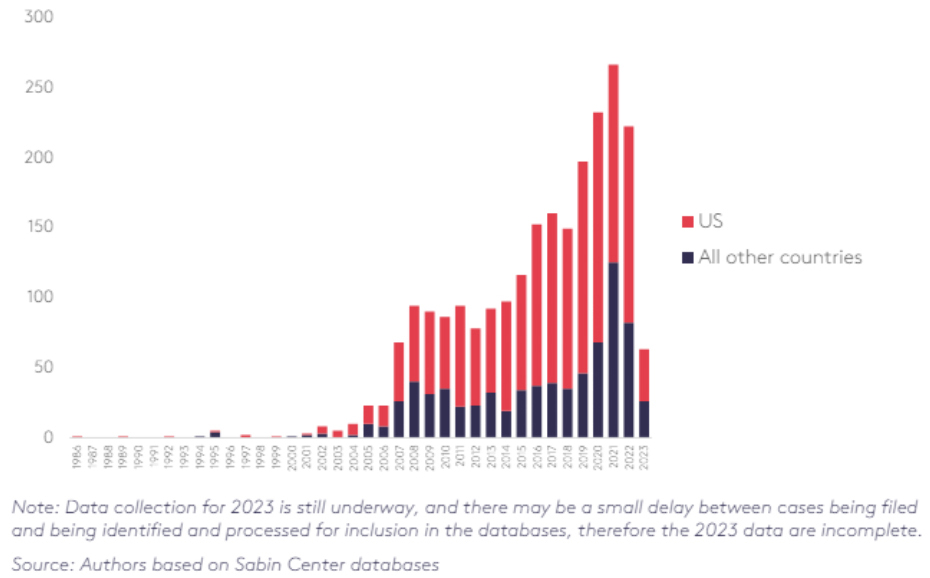
These legal cases have been exemplified by the high-profile cases Client Earth is bringing against governments and large corporations, such as that brought against the Shell board of directors for not transitioning away from fossil fuels fast enough, or against Coca-Cola, Nestlé and Danone for their misleading claims about recycling, or the greenwashing case against Dutch airline KLM.
While the scope will only include the largest businesses within the superyacht industry, the requirement for the due diligence assessment and process to include the value chain will mean that there will be indirect implications for those within the value chain, as the larger business will have a responsibility to ensure that their value chain is also minimising its adverse impacts. Therefore, the smaller business not in the scope will be influenced by the choices and decisions made by those falling within the scope, meaning they may want to improve their impact or risk losing business.
This directive, while watered down from the original intent, is representative of increasing expectations of corporations regarding their formalised action to take responsibility and address their negative human and environmental impacts. It also sets more precedent and foundation for companies to be legally responsible for improving this aspect of their business. It will take a number of years for the results of this to be incorporated into national laws, but when this due diligence is carried out the results will be interesting to see, as well as exactly the influence it has on the businesses outside of the scope within the industry, and how their operations will be influenced by the results of the in-scope companies carrying out this process, alongside the other requirements that will come into effect at a similar time.
NEW: Sign up for SuperyachtNewsweek!
Get the latest weekly news, in-depth reports, intelligence, and strategic insights, delivered directly from The Superyacht Group's editors and market analysts.
Stay at the forefront of the superyacht industry with SuperyachtNewsweek
Click here to become part of The Superyacht Group community, and join us in our mission to make this industry accessible to all, and prosperous for the long-term. We are offering access to the superyacht industry’s most comprehensive and longstanding archive of business-critical information, as well as a comprehensive, real-time superyacht fleet database, for just £10 per month, because we are One Industry with One Mission. Sign up here.
Related news
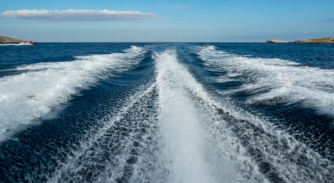
Carbon pricing explained
Carbon tax is a way to pay for emissions, but what is its future within the maritime and superyacht sectors?
Crew

Are yards doing the hard yards?
Are new-build shipyards doing enough to improve their in-house sustainability processes as the clock ticks down to the looming deadline of 2030?
Crew
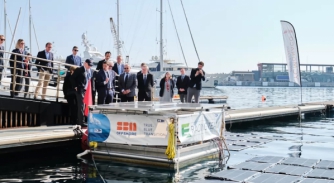
Green hydrogen arrives in Monaco
Yacht Club de Monaco and SBM Offshore have launched a platform to provide green hydrogen in Monte Carlo part of a ‘responsible yachting’ initia
Crew
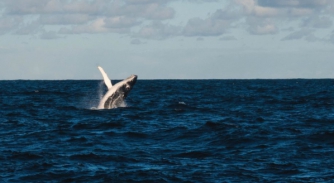
The blue carbon investment
Last year was the hottest on record for the world’s oceans, so how can blue carbon initiatives from the superyacht community help protect them?
Opinion
-(3).jpg)
Crew guidelines go green
The superyacht industry has introduced technical solutions for energy transition, but changes in on-board practices are equally important
Crew
Related news
Carbon pricing explained
1 year ago
Are yards doing the hard yards?
1 year ago
Green hydrogen arrives in Monaco
1 year ago
The blue carbon investment
1 year ago
Crew guidelines go green
1 year ago
NEW: Sign up for
SuperyachtNewsweek!
Get the latest weekly news, in-depth reports, intelligence, and strategic insights, delivered directly from The Superyacht Group's editors and market analysts.
Stay at the forefront of the superyacht industry with SuperyachtNewsweek



